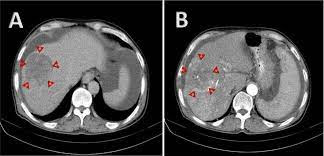HCC (Primary cancer of the liver)
Hepatocellular carcinoma HCC primarily arises in a cirrhotic liver where chronic injury leads to repeated inflammation fibrin oh genesis and disordered liver architecture cirrhotic livers exhibit focal lesions areas of abnormal immature hepatocytes that are predisposed to malignant transformation chronic viral infections such as hepatitis b and c also promote carcinogenesis through enhanced hepatocytes turnover and increased mutation rates hepatocellular carcinomas are phenotypic ly and genetically heterogeneous tumors driven by diverse molecular mechanisms the identification of common genomic alterations has led to the development of targeted therapies that suppress hepatic carcinogenesis through multiple pathways multi kinase inhibitors have been developed that simultaneously target key regulators in angiogenesis, tumorigenesis and metastasis hepatocellular carcinoma is a hyper vascular tumor the initiation growth and metastasis of HCC relies on angiogenesis the formation of new blood vessels from pre-existing vascular beds genetic changes in local hypoxia in tumors leads to the secretion of soluble angiogenic factors that activate resting and öthey lleol cells in adjacent blood vessels these angiogenic factors such as vascular endothelial growth factor are up-regulated in most human tumors to help supply adequate oxygen and nutrients to the growing tumor Veg F binds to the Veg F receptor a tyrosine kinase receptor located on endothelial cells that promotes the activation proliferation and migration of these cells tumor induced up regulation of Veg F is associated with increased tumor growth and poor prognosis several multi kinase inhibitors have been developed that block the activity of veggie afar reventing the formation of new blood vessels and tumors fibroblast growth factor is also up regulated in the majority of HCC cases FGF and Veg F act synergistically to stimulate tumor induced neovascularization FGF has also been implicated in tumor cell proliferation survival and invasion inhibition of this signaling pathway induces apoptosis of HCC cells lenva-Deneb and reco raffinate blocked the activity of the FGF receptor decreasing tumor vascularization and proliferation another angiogenic factor platelet derived growth factor is required for the recruitment of smooth muscle cells and parasites that surround and support new blood vessels several multi kinase inhibitors including lenva Deneb serotonin and reco raffinate limit neovascularization by blocking the activity of the PDGF receptor multi kinase inhibitors may also prevent tumor growth and proliferation by blocking the activity of several other tyrosine kinase receptors such as kit or ret activation of tyrosine kinase receptors initiates complex intracellular signaling pathways that promote cell growth proliferation survival and differentiation these receptors are often over expressed or mutated in cancer cells tumor progression usually involves the action of multiple kinase pathways and targeting several receptors simultaneously with multi kinase inhibitors may provide a synergistic effect and reduce the possibility of drug resistance.
Muhammad Fahad Siddique



